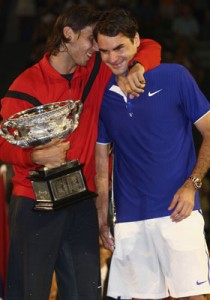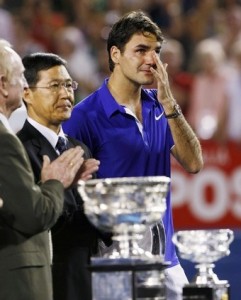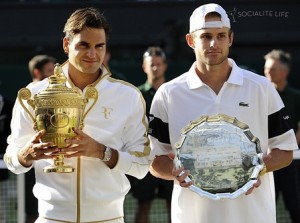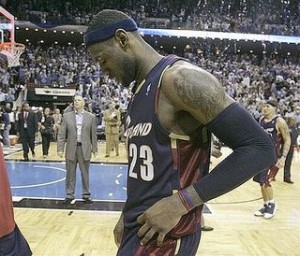Tennis Players Illustrate How To Win And Lose With Dignity

Tennis players regularly have to deal with both the emotional high of winning and the emotional low of losing.
After a spectacular loss to Roger Federer in the 2007 Australian Open, Andy Roddick, said, “It was frustrating, it was miserable, it sucked, it was terrible…Besides that it was fine.”
Decades ago, for those of us in the US old enough to remember, ABC used to open a weekly sports show citing, in equal measure: the Joy of Victory…and the Agony of Defeat (using a horrible skiing accident to illustrate the latter).
The truth is that defeat, though agonizing, can often be the most inspiring illumination of character that comes out of a sporting contest.
This year, Roger Federer took two of the most spectacular losses a champion can accept, and also recorded two of the most spectacular wins a champion could ever make in meeting, then breaking, the all-time Slam record formerly held by Pete Sampras.
But this is an article about that state of grace that can sometimes be entered by a sporting champion in defeat.
1) 2009 Australian Open Final
Roger Federer was so distraught in his runner-up speech that he lost his composure and cried in front of 15,000 fans, an international TV audience and a collection of the sport’s all-time legends gathered at the ceremony ostensibly to honor his achievement in meeting the all-time Slam record.

Roger Federer was ovetaken by emotion after losing the 2009 Australian Open final.
For me, this occasion is memorable for two things. One is the passion that Roger brings to the game that he rarely releases on the court, but that emerged as fans acknowledged their appreciation for it, and he said “God, it’s killing me!” (somewhat reminiscent of the tears he shed at his loss at the 2008 Wimbledon final, where the evident pain of the loss only served to further illuminate how magnificent an event it was).
The second moment that stood out was the gracious way in which the champion of the event, Rafael Nadal, was able to help Roger regroup and make composed remarks, as is expected.
2) 2009 Madrid Master’s Series Semi-Final
It was the longest semi-final in Master’s Series history, not only tournament history. Novak Djokovic walked off the court in an evident state of distress after giving his all and having his heart broken. He acknowledged later that he was having trouble getting over the loss. He skipped Queen’s Club, where he stood to face Nadal again, opted instead for Halle, where he stood instead to face Roger Federer, but lost early, and in fact, his performance (that of both contestants of the Rome semi-final) suffered for months after. Unable to defend points, he dropped from World No. 3 to World No. 4.
For me, and I can’t do it justice, there is something elegant about having a loss affect one’s performance so. It is illustrative of the heart and self-validation that went into that particular contest.
3) 2009 French Open Fourth Round
Rafael Nadal had never lost at Roland Garros. His opponent in the QF was one whom he rather famously disliked on the tour, and to whom he had administered a drubbing 1-and-0 on clay just a few weeks before. The loss was compared by one commentator to that of boxer Mike Tyson against Buster Douglas in 1990—a shocking change of fortune that affected the future of the sport.
Nadal’s extraordinary remarks on the occasion of this loss included some rather poetic work. “Defeats never make you grow, but you also realize how difficult what I achieved up until today was, and this is something you need sometimes. You need a defeat to give the value to your victories.”
The fact that tennis has these traditions of the handshake following every match and occasionally speeches from the loser only seconds after the loss, which are for the most part extraordinarily gracious, was captured with profound irony on the occasion of this loss, as the NBA playoffs were underway, and a famous player and the team he led had failed to qualify. The basketball star in question (Lebron James) walked off the court without making the customary remarks, and so the world’s press was treated to this wonderful dichotomy of grace, recorded in a fantasy telephone call in commentary on ESPN (presented at the last page of this article).
4) 2009 Wimbledon Final

There was truly no loser in the 2009 Wimbledon Final between ANdy Roddick and Roger Federer.
Yet again, Andy Roddick lost in spectacular fashion to Roger Federer, and handed him one of the greatest triumphs of Federer’s career—his 15th Grand Slam title (allowing Roger to reverse the tears he’d shed in January at the AO). After playing what amounted to a seven-set match (the final set went to 14-16, and not in his favor), he had to sit in the chair and applaud while Roger made the rounds with the golden trophy in his hands.
Andy Roddick has borne the expectations of American tennis fans for half a decade as the heir apparent to the tradition of Pete Sampras and Andre Agassi, John McEnroe and Jimmy Conners. Though consistent for 10 years and one of the few to be ranked in the top 10 for eight consecutive years, Roddick may yet go down in history as a ‘One Slam Wonder.’
His closest chance of wiping that appellation from his record and perhaps the greatest performance of his career ended in an extremely tough loss. Yet he did not throw his racket to the ground; he retained his sense of humor. He did not get down on himself. He showed us that a champion digs deep, and sometimes when the contestants leave the field, the audience feels as if there was no loser.
5) 2009 US Open Fourth Round
The biggest disappointment of my career, said Andy Murray, losing in the fourth round to Marin Cilic, after being touted (as he always is for every single Slam) as the hands-down, odds-on betting favorite to win the tournament. As such, it was a big disappointment to more people than just Murray! The young Scot’s savvy, canny game has so much potential and seemingly is without the fitness problems that plague Novak Djokovic.
As the heir apparent to Fred Perry and Tim Henman, he shoulders the expectation of a nation of tennis lovers where the game was born to be the next great British champion. He bears these expectations with considerable grace, and none more profound than when he has to stand up before the world’s (but particularly the British) press, and expound on the reasons for the loss and his feelings about it. On this occasion, he offered these explanations in somber, sincere tones, without the glib, cavalier attitude of Andy Roddick or the occasional self-pity of Roger Federer.
6) 2009 Paris Third Round
Everybody loved Marat Safin. One commentary noted that he leaves the tour without having made a single enemy (though he had some pretty sour remarks to make about Andre Agassi, and one wonders how Andre would have responded if he’d still been playing, but then again that kind of speculation is moot).
He played a competitive, three-set match against Delpo, showing his notorious occasional flashes of brilliance. After his final professional loss, the French held a special award ceremony, and gave Safin the Key to the City. Safin’s “aw shucks” attitude will, for me, leave a lasting sense of charm.
So congratulations to the losers, for their losses have, in some cases, conveyed more “attitude” than yet another win might have.
The following is an excerpt from an article by senior writer Tim Keown that originally appeared on ESPN Page 2. This article (a fantasy conversation) captures some of the expectations of character that tennis seems to enjoy at the expense of some other sports. The original article (very funny in its entirety) can be found here (and seemingly archived under ‘NBA’ and not ‘tennis’).
LEBRON JAMES: …You gotta understand. When we lost to Orlando, I was out of there, baby.
Right from the court to the locker room. Then I got a cop on each side of
me, my headphones in my ears and headed for the bus. Didn’t need to talk.
Didn’t have anything to say, man. Did I tell you I’m a winner?
NADAL: I have won a lot. I don’t like to lose. I have won Wimbledon and
Australia and Roland Garros, but when I lose it is part of my job to….

LeBron James is a great basketball player, but he still has lessons to learn in how to act with dignity in victory and defeat.
JAMES: You know the funny thing? I didn’t even have the music on, man. I
just made it look like it. Just playin’, you know?
NADAL: That is…funny?
JAMES: They thought I couldn’t hear ’em. They were all like, “LeBron, can we
get a minute? LeBron, what do you have to say about the loss?” When I
didn’t break stride you should have heard them muttering and complaining.
Those cops kept on walking, and I kept on walking. Right to the bus. Right
off the bus to the plane. Right on home.
NADAL: Sometimes a good walk can help calm a man’s….
JAMES: Wait, wait, wait. That reminds me. You gotta come clean with me on one
thing: With calm? What kind of stuff is that? Is that a tennis thing or
something? It’s like you’re talking about calm all the time, man. Calm this
and calm that. First off, I’m not accepting anything, and I’m definitely not
accepting it with calm. You understand? Calm’s messed up.
NADAL: I guess I just have a different way of thinking. I was not happy—I
was very unhappy—but I realize it is not the end of the world. In the
end, I have no one to blame but myself.
JAMES: Well, man—that’s one thing we don’t have in common.
(JAMES laughs loudly. In the background there is more laughter. NADAL thinks
he hears the sound of hands slapping.)
JAMES: But back to what I’m saying, man. That dude…what was his name?
NADAL: Robin Soderling.
JAMES: Yeah, whatever. He was the 23rd seed?
NADAL: Please, do not remind me.
JAMES: Didn’t he make fun of you once before, mocking what you do in front
of everyone at Wimbledon?
NADAL: Please do not remind me.
JAMES: So this time he beat you up, ran you all over the damned court, and
when it was over you congratulated him? You shook the man’s hand?
NADAL: As I said, I was taught to be gracious, to be a sportsman….
Perhaps we do not speak the same language, no?
Hi, just found this here after an fast yahoo search. Neat site you have here! Keep it up!
Many thanks for offering these kinds of helpful advise.
I like the helpful info you provide in your articles.
I will bookmark your weblog and check again here frequently.
I’m quite sure I will learn lots of new stuff
right here! Good luck for the next!